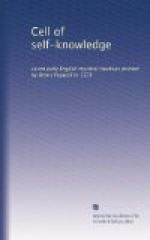I have borrowed a phrase from St. Catherine, “The Cell of Self-Knowledge,” la cella del cognoscimento di noi, as the title of this little volume. Knowledge of self and purity of heart, the mystics teach, are the indispensable conditions for the highest mystical elevation. Knowledge of self, for Richard of St. Victor, is the high mountain apart upon which Christ is transfigured; for Catherine of Siena, it is the stable in which the pilgrim through time to eternity must be born again. “Wouldest thou behold Christ transfigured?” asks Richard; “ascend this mountain; learn to know thyself."[22] “Thou dost see,” writes Catherine, speaking in the person of the eternal Father, “this sweet and loving Word born in a stable, while Mary was journeying; to show to you, who are travellers, that you must ever be born again in the stable of knowledge of yourselves, where you will find Him born by grace within your souls."[23] The soul is a mirror that reflects the invisible things of God, and it is by purity of heart alone that this mirror is made clear. “Therefore,” writes Richard of St. Victor, “let whoso thirsts to see his God, wipe his mirror, purify his spirit. After he hath thus cleared his mirror and long diligently gazed into it, a certain clarity of divine light begins to shine through upon him, and a certain immense ray of unwonted vision to appear before his eyes. This light irradiated the eyes of him who said: Lord, lift Thou up the light of Thy countenance upon us; Thou hast put gladness in my heart. From the vision of this light which it sees with wonder in itself, the mind is wondrously inflamed and inspired to behold the light which is above itself."[24]
Pepwell’s volume has been made the basis of the present edition of these seven treatises; but, in each case, the text has been completely revised. The text of the Benjamin, the Epistle of Prayer, the Epistle of Discretion, and the Treatise of Discerning of Spirits, has been collated with that given by the Harleian MSS. 674 and 2373; and, in most cases, the readings of the manuscripts have been adopted in preference to those of the printed version. The Katherin has been collated with Caxton’s Lyf; the Margery Kempe with Wynkyn de Worde’s precious little volume in the University Library of Cambridge; and the Song of Angels with the text published by Professor Horstman from the Camb. Ms Dd. v. 55. As the object of this book is not to offer a Middle English text to students, but a small contribution to mystical literature, the orthography has been completely modernised, while I have attempted to retain enough of the original language to preserve the flavour of mediaeval devotion.
Edmund G. Gardner.
I.
Here followeth A very devout treatise,
named Benjamin, of the mights
and virtues of man’s soul,
and of the way to true
contemplation,
compiled by A noble and famous
doctor, A man of great holiness
and
devotion, named Richard of saint
Victor




